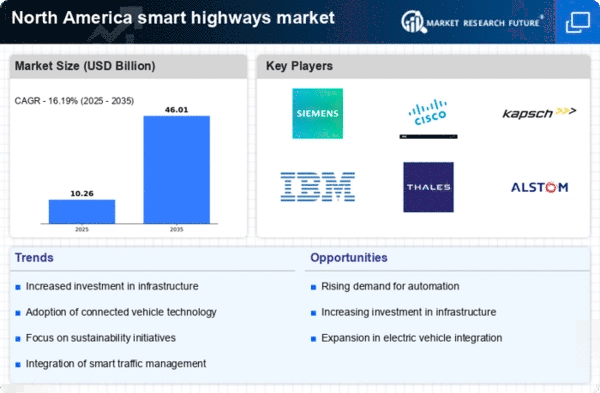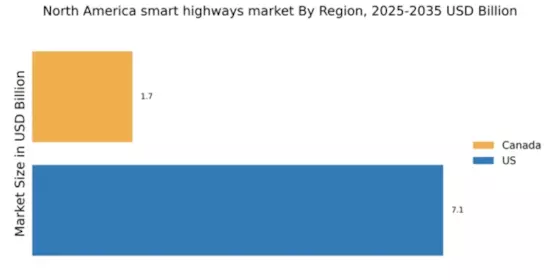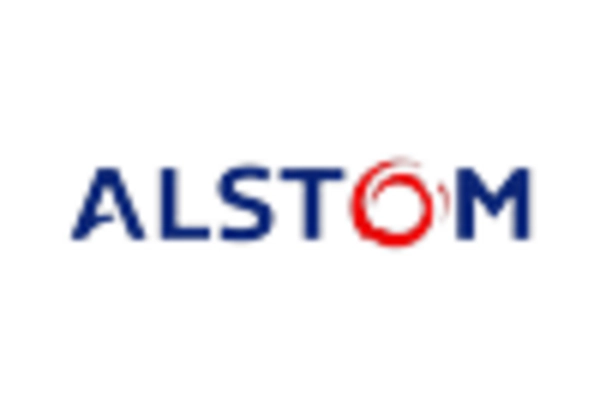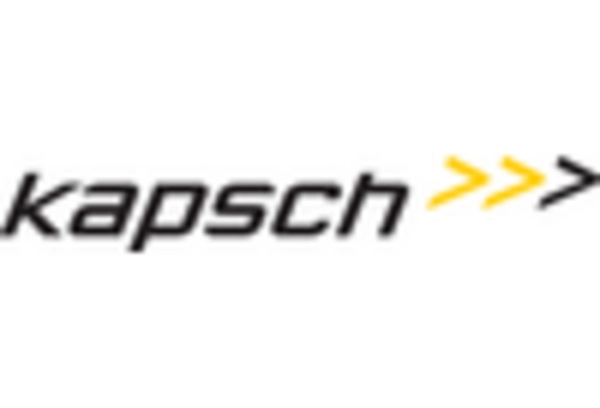Government Initiatives and Funding
Government initiatives play a crucial role in propelling the smart highways market in North America. Various federal and state programs are designed to promote the development and implementation of smart transportation solutions. For instance, the U.S. Department of Transportation has allocated substantial funding for smart highway projects, with investments reaching approximately $1.5 billion in recent years. These initiatives aim to enhance road safety, reduce traffic congestion, and promote sustainable transportation practices. The smart highways market benefits from these funding opportunities, as they enable the deployment of advanced technologies such as intelligent traffic management systems and real-time monitoring solutions. As government support continues to grow, it is anticipated that the market will expand significantly, potentially achieving a compound annual growth rate (CAGR) of over 15% through the next decade.
Rising Demand for Enhanced Road Safety
The increasing demand for enhanced road safety is a significant driver for the smart highways market in North America. With road traffic accidents being a leading cause of fatalities, there is a pressing need for innovative solutions to improve safety on highways. Smart highways equipped with advanced technologies such as automated traffic enforcement, real-time hazard detection, and vehicle-to-vehicle communication can potentially reduce accident rates by up to 40%. The smart highways market is responding to this demand by integrating safety features into highway infrastructure, which not only protects drivers but also enhances public confidence in road travel. As awareness of road safety issues continues to grow, investments in smart highway technologies are expected to rise, further driving market expansion.
Integration of Renewable Energy Sources
The integration of renewable energy sources into highway infrastructure is emerging as a vital driver for the smart highways market in North America. As the focus on sustainability intensifies, smart highways are increasingly being designed to incorporate solar panels and wind turbines, which can power traffic signals and lighting systems. This shift towards renewable energy not only reduces operational costs but also minimizes the carbon footprint of transportation systems. The smart highways market is likely to see a surge in projects that utilize renewable energy, with estimates suggesting that such initiatives could lead to a 20% reduction in energy costs for highway operations. This trend aligns with broader environmental goals and reflects a growing commitment to sustainable transportation solutions.
Technological Innovations in Traffic Management
Technological innovations in traffic management systems are significantly influencing the smart highways market in North America. The adoption of artificial intelligence (AI) and machine learning algorithms enables real-time traffic analysis and predictive modeling, which can optimize traffic flow and reduce congestion. As of 2025, it is projected that smart traffic management systems could improve traffic efficiency by up to 25%, leading to shorter travel times and reduced emissions. The smart highways market is witnessing a shift towards these advanced technologies, with investments in AI-driven solutions expected to exceed $5 billion by 2030. This trend highlights the critical role of technology in enhancing the functionality and efficiency of highway systems.
Advancements in Vehicle-to-Infrastructure Communication
The emergence of vehicle-to-infrastructure (V2I) communication technologies is a pivotal driver for the smart highways market in North America. These advancements facilitate real-time data exchange between vehicles and road infrastructure, enhancing traffic management and safety. As of 2025, it is estimated that V2I systems could reduce traffic congestion by up to 30%, thereby improving overall travel efficiency. The integration of V2I technologies into smart highways allows for adaptive traffic signals and dynamic lane management, which are crucial for optimizing traffic flow. Furthermore, the smart highways market is likely to witness increased investments in V2I infrastructure, with projections indicating a potential market value exceeding $10 billion by 2030. This trend underscores the importance of communication technologies in shaping the future of transportation.

















